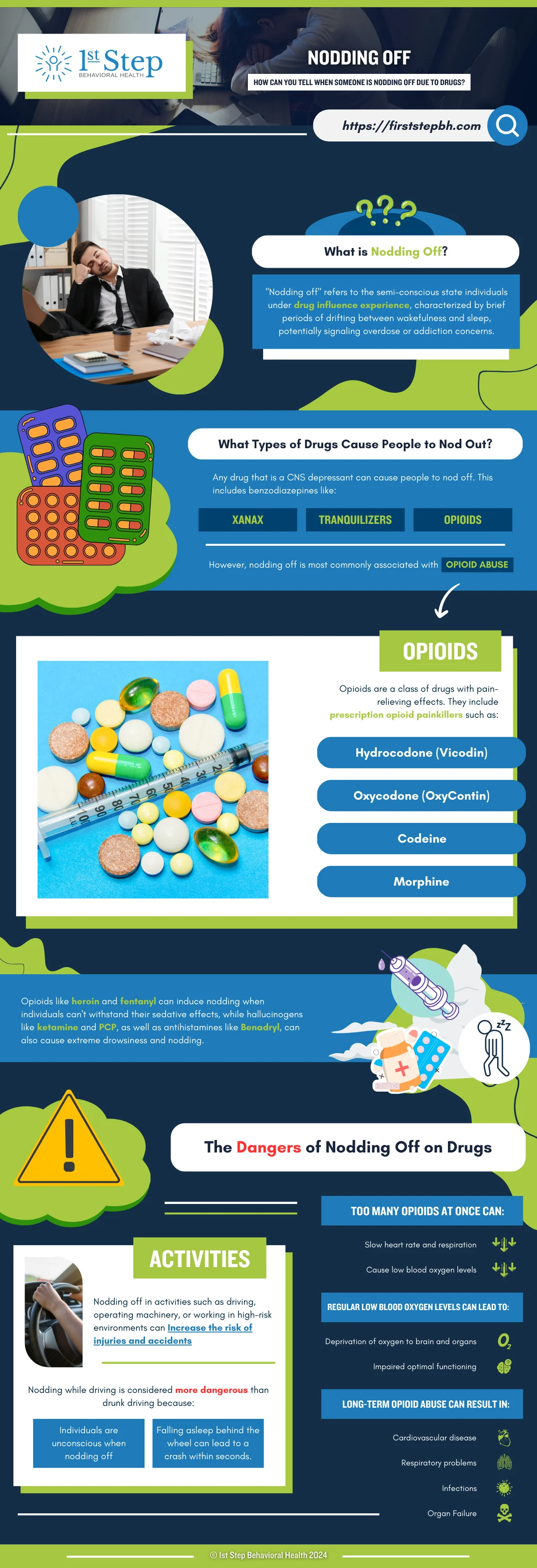When a loved one begins to abuse drugs, you may observe several worrying signs and symptoms. One frequently overlooked sign of drug abuse is commonly referred to as “nodding out,” “nodding off,” or “being on the nod.”
Initially, nodding off might appear innocent, as it could simply look like the person is experiencing fatigue or difficulty staying awake. However, in the context of drug use, nodding off, especially on substances like heroin or other opioids, is more than just being tired and is associated with numerous health risks.
This article will explore what nodding off looks like, what causes it, and why it’s dangerous. If you or someone you love are struggling with addiction, please call First Step Behavioral Health today to discuss your treatment options.

What is Nodding Off?
Nodding off describes what happens when a person who has been using drugs drifts in and out of consciousness. They may look like they are falling asleep, slumping forward with their eyes closing and head drooping, but may suddenly awaken again, only to nod back out.
People may nod out while standing or sitting. Their eyelids may flutter, briefly close, and slowly open back up again. While nodding off, people may respond to noise or physical stimuli, but return to a state of semi or unconsciousness.
Nodding happens when an individual consumes a dose of depressant drugs significant enough to induce drowsiness or partial loss of consciousness, without causing them to faint or lose consciousness entirely. In certain instances, nodding off can signal a potential overdose. It indicates that the person has ingested a substantial amount of central nervous system (CNS) depressants, surpassing the body’s ability to cope with the effects. It may also indicate a battle with addiction.
What Types of Drugs Cause People to Nod Out?
Any drug that is a CNS depressant can cause people to nod off. This includes benzodiazepines like Xanax, tranquilizers, and opioids. However, nodding off is most commonly associated with opioid abuse.
Opioids are a class of drugs with pain-relieving effects. They include prescription opioid painkillers such as:
Opioids also include illicit opioids such as heroin and illegally manufactured fentanyl. Heroin and fentanyl are extremely potent, so both cause people to nod off regularly. People begin nodding out of heroin or fentanyl when their bodies can no longer keep up with the sedating effects.
Certain hallucinogens, such as ketamine and PCP, can also cause people to experience extreme drowsiness, sleepiness, and a dream-like state. Additionally, certain people may experience nodding after taking antihistamines, such as Benadryl.
The Dangers of Nodding Off on Heroin or Other Drugs
Drowsiness so extreme that it causes someone to drift in and out of consciousness is potentially hazardous. First of all, it is a clear sign that too much of a substance has been consumed, and may indicate an overdose.
Using too many opioids at once can slow down heart rate and respiration, leading to low blood oxygen levels. When the body experiences low blood oxygen levels on a regular basis, the brain and other organs begin being deprived of the oxygen they need to function optimally. Not only that, but long-term opioid abuse can cause a range of health problems, such as cardiovascular disease, respiratory problems, infections, and organ failure.
Additionally, nodding while driving, operating machinery, working in high-risk environments, or while in public can be potentially dangerous. It may increase the risk of injuries and accidents. Some people consider nodding while driving to be even more dangerous than drunk driving because when someone is drunk, at least they are conscious. Falling asleep behind the wheel can result in a crash in a matter of seconds.
Symptoms of an Opioid Overdose
While nodding can simply be a side effect of opioid use, it can also indicate something more serious. In extreme cases, nodding out can be a sign of opioid overdose.
Additional signs of an opioid overdose are:
- Extreme drowsiness
- Weak heartbeat
- Slow or stopped breathing
- Shallow or labored breathing
- Low blood pressure
- Vomiting, gurgling, or gasping noises
- Unresponsiveness
- Blu-ish colored fingernails and lips
- Pale skin
- Death
In the event of a suspected overdose, call 911 immediately and administer naloxone, if available.
Signs of Addiction
People who are “on the nod” regularly may be suffering from opioid or heroin addiction. Common signs of opioid addiction are:
- Developing tolerance, causing a person to increase their dose over time or begin using stronger drugs
- Experiencing withdrawal symptoms when they try to stop using
- Spending excess time and money on drugs
- Engaging in risky behaviors
- Lying to loved ones
- Isolating from friends and family
- Physical symptoms such as pinpoint pupils, skin flushing, or itching of the hands and/or face
- Hiding drug paraphernalia
- Changes in mood and behavior
Finding Treatment
If you, a family member, or someone you care about is ready to stop using heroin or other drugs, please don’t hesitate to ask for help. At First Step Behavioral Health, we offer numerous treatment options including medication-assisted treatment (MAT) and peer-led support groups that can help you overcome substance abuse and achieve a sober, healthy life.
To learn more about our treatment programs or to begin with a confidential, risk-free assessment, please contact us today.
Jump to a Section
Call (855) 425-4846
